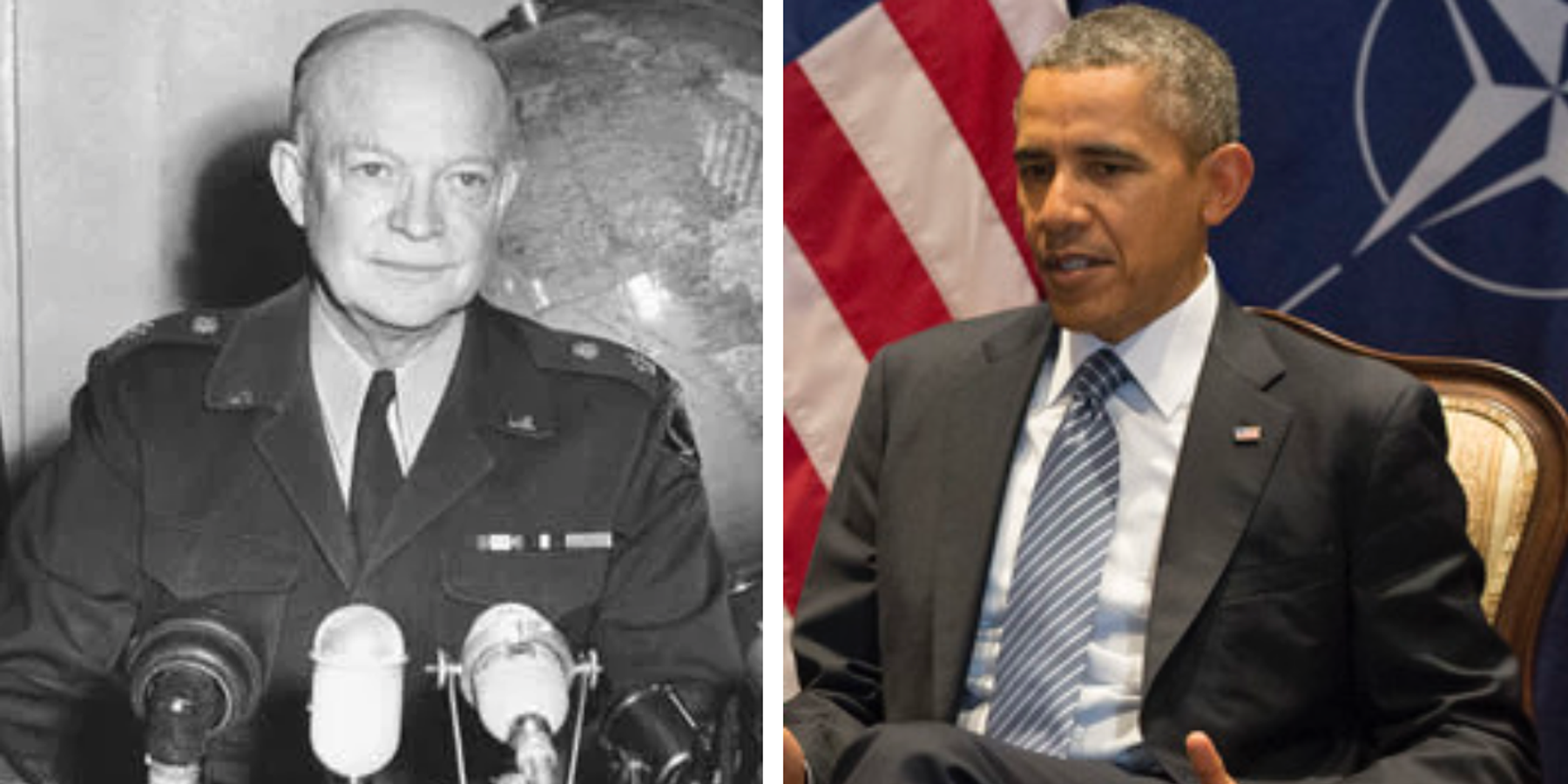President Trump's latest comments criticizing NATO and the ensuing media reaction obscure the fact that Americans have long held dissenting opinions on the U.S. relationship to European security.
As has happened all too often throughout the Trump era, the heat of escalating rhetoric on the part of the 45th President and his committed adversaries has distracted from the more substantive foreign policy debate.
Today, the U.S-European security relationship has never been more sacrosanct, at least in the mind's eye of the national security establishment and their allies in the mainstream press. Yet historically, the range of debate and criticism of this ostensibly sacred pact has been far more open than nostalgia or the modern commentariat may suggest.
Throughout American involvement in NATO, the nation's national security elites, members of Congress, commentators, and, yes, presidents, too, have all challenged the contours of commitment to the organization and its members at one time or another. Furthermore, they did so when Western countries faced a significantly larger Soviet military deployed deep into the heart of Central Europe.
During the early Cold War, the nature of American involvement in the alliance and its commitment to staff Europe with a permanent garrison were not seen as beyond question, even by American officials in positions of authority. In fact, American Cold War architects sold an American garrison in Europe as a temporary measure meant to shore up allies still licking their wounds from the Second World War. In congressional testimony concerning the ratification of the NATO treaty, Sen. Bourke B. Hickenlooper (R-Iowa) pressed Secretary of State Dean Acheson on if he thought the treaty meant that the U.S. would leave "substantial numbers of troops over there." An indignant Acheson responded, "[t]he answer to that question, Senator, is a clear and absolute 'No.'"
Even as Acheson's assurances to Congress proved hollow, NATO's first commander, General Dwight D. Eisenhower, while supportive of NATO's legal mechanisms of collective security, believed that America's garrison and material aid were temporary. Eisenhower warned that if "in 10 years, all American troops stationed in Europe for national defense purposes have not been returned to the United States, then this whole project will have failed."
Later as president, Eisenhower, despite solidifying the Cold War policies of his predecessor and eschewing the Republican Party's non-interventionism, continued to press behind the scenes for a greater degree of burden-sharing on the part of NATO's European members, quietly fuming that they were "making a sucker out of Uncle Sam." Several of his successors shared Eisenhower's sentiments, from Kennedy and Johnson to George W. Bush.
In Congress, the extent of American military involvement remained a persistent issue for the Republican Right. Be they principled noninterventionists or Asia First unilateralists, the extent of American troop presence in Europe remained a contested issue. Retired Army officer Bonner Fellers, writing in a July 1949 issue of Human Events, a conservative magazine, summed up the widely agreed-upon position of these dissenters. While Fellers believed that the NATO treaty had "enormous psychological value," as it served as a "symbol of unity" and deterrence, he did not think that that should translate into a massive and permanent military garrison in Western Europe.
Fellers revisited the issue two years later in an article for Human Events, which was read into the Congressional Record. Rather than see the American European garrison as a deterrent, Fellers asserted that it could be viewed as a provocation and argued that the "presence of our forces on the Rhine gives Stalin a visible symbol, a unifying agent which tends to enlist the support of all Russians behind the Kremlin."
It is important to note that Fellers was hardly a dove. Instead, he was a committed anti-communist who loathed the Soviet Union and supported a nuclear deterrence on the cheap, a Fortress America 2.0. Yet, he, like many within the Republican Right, did not allow their ideological priors to automatically dictate a desire for endless security commitments to Western Europe.
On Capitol Hill, Fellers's views were common and supported by conservative Republicans who saw an American military garrison as an expensive handout to allies whose rebuilt economies could shoulder their defense, all while providing little deterrent effect. In 1953, speaking on the issue of America's military mission in Europe, Rep. Lawrence H. Smith (R-Wis.) asked rhetorically, "[w]here is the threat of military aggression?"
According to Smith, after returning from a fact-finding mission in Europe, his subcommittee on Europe reported that "there was no fear of communism in the hearts and the minds of the people there." The sentiments espoused by Fellers and Smith persisted in pockets of the Republican Right throughout the early Cold War despite the ideological demands of the era.
During the final decades of the Cold War, opposition to the presence of an American military garrison in Western Europe and the continuation of military aid emanated primarily from the left wing of the Democratic Party as a new generation of Democrats took office and sought to rein military spending and commitments. On Capitol Hill, Democrats attempted to force American troop level cuts in Europe in the House in 1988, and the Senate in 1990.
With the fall of the Berlin Wall and the collapse of the Soviet Union, the horseshoe of opposition to maintaining the status quo thickened as a body of conservative Republicans joined progressive Democrats in opposing NATO expansion, first in 1994 and then in 1999. While both votes failed, and the United States maintained a sizeable garrison in Europe, the opposition to outdated Cold War paradigms remained and flowed freely, untainted by the scurrilous charge of echoing "Putin talking points."
Indeed, even as late as November 2016, President Obama mirrored the sentiments of then President-elect Donald Trump in stating that “[i]f Greece can meet this NATO commitment, all our NATO allies should be able to do so."
This latest fervor has, as all too often now, completely ignored these historical debates around American foreign policy commitments, creating in their passions an ahistorical sense of policy inevitability. If Americans past and present, from presidents on down, could question the contours of American security commitments and did so in far more perilous times, then so should we.
- I was there: NATO and the origins of the Ukraine crisis ›
- Turkey, Sweden, and NATO’s identity crisis ›
- When officials say the quiet part about Russia and NATO out loud ›
- NATO seeks to ‘Trump proof’ Ukraine aid | Responsible Statecraft ›
- Imagine: A new and improved NATO | Responsible Statecraft ›
- Fareed Zakaria, stuck somewhere in 1950 or 1995, is wrong again | Responsible Statecraft ›
















